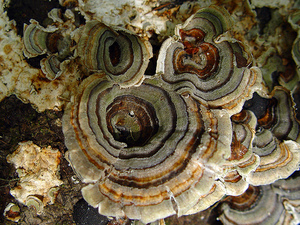Compound derived from mushrooms shows promise in treating deadly cancer in dogs, may help humans

The Coriolus versicolor mushroom, known commonly as the Yunzhi mushroom, has been used in traditional Chinese medicine for more than 2,000 years.
flickr photo by Franco Folini
When a dog is diagnosed with hemangiosarcoma, the prognosis is not good, and even with chemotherapy treatment, long-term survival is generally out of the question. That is why so many pet owners have chosen not to treat that type of cancer (which starts in the blood cells and progresses to the spleen), along with the cost and the rigors of repeated veterinary visits.
Two veterinary researchers from the University of Pennsylvania School of Veterinary Medicine decided to take a closer look at addressing the disease with an alternative approach: using a compound derived from the Yunzhi (Coriolus versicolor) mushroom that has been used in Traditional Chinese Medicine for more than 2,000 years.
The compound, polysaccharopeptide, or PSP, is thought to have immune-boosting properties and will affect tumors.
The researchers, Dorothy Cimino Brown, professor and chair of the Department of Clinical Studies and director of the Veterinary Clinical Investigation Center, and Jennifer Reetz, attending radiologist in the Department of Clinical Studies, co-authored the study, which was funded by a grant from Chinese Medicine Holdings LTD. and published in the journal Evidence-Based Complementary and Alternative Medicine.
A PSP preparation compounded by pharmacists at the university, called I'm-Yunity, was given to 15 dogs — divided into three groups and dosed with 25, 50 or 100 mg/kg/day — respectively. During the study, the canines' blood was tested and ultrasounds were used to monitor changes in tumor growth.
Results of the researchers' trial suggest that I'm-Yunity was effective in thwarting the tumors' progression, and the highest dose gave the most favorable results, with a median survival of 199 days. Best of all, undergoing treatment with the PSP preparation is easier than the current go-to treatment, and there are no known adverse side effects.
"We were shocked. Prior to this, the longest reported median survival time of dogs with hemangiosarcoma of the spleen that underwent no further treatment was 86 days. We had dogs that lived beyond a year with nothing other than this mushroom as treatment," said Cimino Brown.
More trials are planned in dogs with hemangiosarcoma and other cancers.
Cimino Brown added, "Although hemangiosarcoma is a very sad and devastating disease in the long term, if we prove that this works, this treatment can be a really nice alternative for owners to have increased quality time with their pet at the end of its life."
Along with future studies in animals, the company that produces I'm-Yunity is thinking about conducting trials in humans. This isn't the first time that the worlds of veterinary medicine and human medicine have converged. Many of the chemotherapy drugs that are used in pets have previously proven effective in humans, and researchers are taking advantage of the pared-down nature of canine genetics to gain insight into the human genome.
Read more about the study on PSP and canine cancer by clicking here.
Lorrie Shaw leads the pets section for AnnArbor.com. Connect with her on Google + or e-mail her directly.


Comments
Phyllisj Manning
Fri, Dec 14, 2012 : 4:07 a.m.
Hemangiosarcoma is a rare, rapidly growing, highly invasive variety of cancer, occurring almost exclusively in dogs and rarely in cats.hemangiosarcoma
Millicent Little
Wed, Sep 19, 2012 : 5:21 p.m.
This is a great article!
LA
Wed, Sep 19, 2012 : 2:53 p.m.
Thank you!